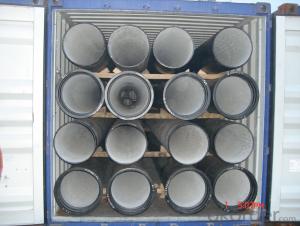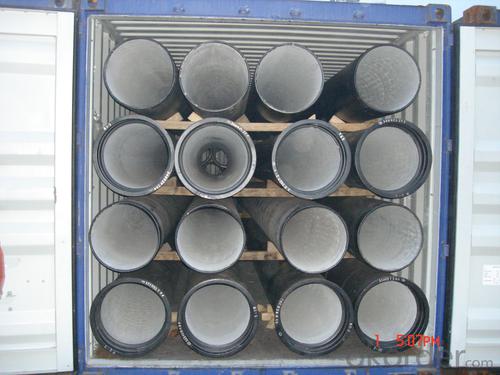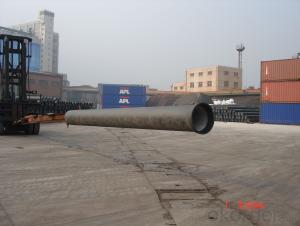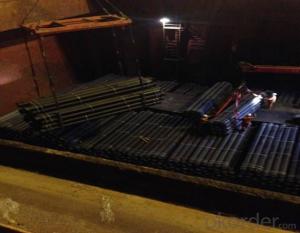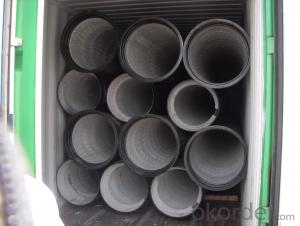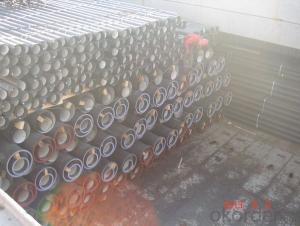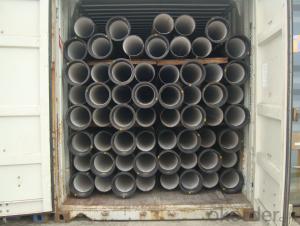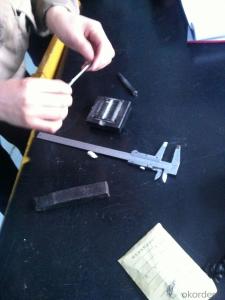DUCTILE IRON PIPES AND PIPE FITTINGS K8CLASS DN200
- Loading Port:
- Tianjin
- Payment Terms:
- TT OR LC
- Min Order Qty:
- 22 pc
- Supply Capability:
- 3000 pc/month
OKorder Service Pledge
OKorder Financial Service
You Might Also Like
Material : Ductile Cast Iron
Size Range : DN 80mm to DN 2000mm
Unit Effective Length : 6m or 5.7m
Manufacture Standard: ISO 2531:1998/ EN 545:2006/EN 598:2007
Annual capacity : 200,000 tons
Coating Exterior: Zinc 130g/m2 according to ISO 8179-1 and bitumen coating 70 microns.
Cement Interior: Portland Cement/ High Alumina Cement/ Sulphate Resisting Cement Lining according to ISO 4179
Special requirements on external coating and internal lining can be applied
We also provide accessories such as SBR/EPDM rubber gaskets, lubricant paste, pipe caps, PE sleeves, etc.
Additional Parts:
Each pipe is strictly inspected according to related standard to ensure permanently high performance.
Easy Installation at site and service free for life
Long Service Lifespan
Quotation will arrive you within 24hours once we get your inquiry.
We guarantee offering you a competitive price.
A copy of original inspection reports of pipes will be offered after shipment.
Photos of loading process will be sent to the customer after shipment effect.
We will follow-up the delivery progress after shipment effect and update to the customer on weekly basis.
- Q: Are ductile iron pipes suitable for mining applications?
- Yes, ductile iron pipes are suitable for mining applications. Ductile iron pipes are known for their strength, durability, and resistance to corrosion, making them ideal for underground mining operations. They can withstand high pressure, heavy loads, and abrasive materials commonly found in mining environments. Additionally, their flexible nature allows for easy installation and maintenance in challenging mining conditions.
- Q: Does the cast iron pipe for spheroidal graphite need corrosion protection when laying underground?
- Ductile cast iron pipe after annealing, the microstructure is ferrite and pearlite, good mechanical properties, excellent corrosion resistance, good ductility, good sealing effect, simple installation, mainly for municipal, industrial and mining enterprises, water supply, gas, oil etc..
- Q: What are the requirements for the hydrostatic test of ductile iron pipes?
- The hydraulic pressure test shall be carried out in the backfill before trying to allow the pressure after passing the backfill, backfill, the graded gravel fill to 300mm above the top of pipe, and then the soil backfill, backfill process by 200~300 tamped pipeline above 500mm within more than 500 can be used in artificial ramming, mechanical compaction. The degree of compaction shall not be less than 0.93.
- Q: Method for joining cast iron pipes
- The connection between the pipe and the pipe adopts the form of socket type or flange disk interface. According to the function, it can be divided into two kinds: flexible interface and rigid interface. The flexible interface is sealed with rubber ring, which allows a certain degree of corner and displacement, so it has good seismic resistance and tightness. It is easy and quick to install than rigid interface. It has little labor intensity according to the casting method.
- Q: Can ductile iron pipes be used in areas with high temperature variations?
- Ductile iron pipes are capable of being used in regions experiencing significant temperature fluctuations. These pipes possess exceptional thermal conductivity and can endure a wide range of temperature changes while maintaining their structural integrity. Their high coefficient of linear expansion enables them to adapt to temperature alterations without imposing substantial stress on the pipes. Consequently, ductile iron pipes are suitable for deployment in locales where extreme temperature variations, such as scorching summers and freezing winters, occur. Furthermore, these pipes exhibit remarkable resistance to thermal shock, enabling them to withstand abrupt temperature shifts without suffering cracks or breakages. In conclusion, ductile iron pipes are a dependable and long-lasting option for areas characterized by substantial temperature variations.
- Q: What are the different coating thickness options for ductile iron pipe?
- The different coating thickness options for ductile iron pipe vary depending on the specific application and requirements. However, common coating thickness options for ductile iron pipe range from 200 to 400 microns.
- Q: Are ductile iron pipes suitable for railway crossings?
- Railway crossings can indeed utilize ductile iron pipes. Ductile iron, a robust and long-lasting material, finds extensive use in numerous applications, which include water and sewage systems. Its exceptional tensile strength and flexibility allow it to withstand heavy loads and vibrations, both of which are commonly encountered in the vicinity of railway crossings. Moreover, ductile iron pipes exhibit exceptional resistance to corrosion, making them particularly valuable in areas prone to moisture and exposure to diverse weather conditions. This resistance guarantees the pipes' durability, ultimately reducing the need for maintenance and replacement, thus cutting costs. Furthermore, ductile iron pipes are renowned for their effortless installation and versatility. They seamlessly integrate with other pipe types and fittings, facilitating their incorporation into the overall railway crossing infrastructure. However, it is important to bear in mind that the suitability of ductile iron pipes for railway crossings hinges on various factors, such as load requirements, soil conditions, and specific project specifications. Consulting engineering professionals and adhering to industry standards and regulations is vital to ensure the appropriate selection and installation of ductile iron pipes for railway crossings.
- Q: Can ductile iron pipes be used for high-pressure applications?
- Ductile iron pipes are capable of being utilized in high-pressure scenarios. This material, known for its strength and durability, can endure substantial pressure and loads. Its exceptional mechanical properties, such as its high tensile strength and impact resistance, make it ideal for a variety of uses, including water and wastewater systems, oil and gas pipelines, and industrial processes. Furthermore, ductile iron pipes possess a remarkable resistance to corrosion and abrasion, further bolstering their suitability for high-pressure environments. Nonetheless, it is crucial to consider the specific requirements and design factors of the application to ensure that the ductile iron pipes meet the necessary standards and specifications for the desired pressure range.
- Q: What are the different lining materials available for ductile iron pipe?
- There are several different lining materials available for ductile iron pipes. These linings are used to protect the pipe from corrosion and extend its lifespan. Some common lining materials include: 1. Cement Mortar Lining: This lining consists of a layer of cement mortar applied to the interior surface of the pipe. It provides a smooth and durable barrier against corrosion and is commonly used in water and wastewater applications. 2. Polyethylene Encasement: Polyethylene encasement involves wrapping the pipe with a layer of polyethylene film. This lining provides excellent corrosion protection and is often used in aggressive soil conditions. 3. Polyurethane Lining: Polyurethane lining is a spray-applied material that forms a seamless and flexible barrier inside the pipe. It offers superior resistance to chemicals and abrasion, making it suitable for applications involving aggressive fluids. 4. Epoxy Lining: Epoxy lining is a popular choice for lining ductile iron pipes, as it provides excellent resistance to corrosion and chemicals. It is typically applied as a liquid coating that cures to form a smooth and protective layer. 5. Zinc Coating: Zinc coating, also known as galvanizing, involves applying a layer of zinc to the exterior surface of the pipe. This lining provides corrosion resistance and is commonly used in outdoor and exposed applications. These lining materials offer different advantages and are chosen based on the specific needs of the application. Factors such as the type of fluid being transported, environmental conditions, and expected service life are considered when selecting the most suitable lining material for ductile iron pipes.
- Q: How can stainless steel pipes and ductile iron pipes be joined?
- The stainless steel pipe can be used as a socket or socket, so as to be directly connected with the connection mode of the ductile iron pipe
Send your message to us
DUCTILE IRON PIPES AND PIPE FITTINGS K8CLASS DN200
- Loading Port:
- Tianjin
- Payment Terms:
- TT OR LC
- Min Order Qty:
- 22 pc
- Supply Capability:
- 3000 pc/month
OKorder Service Pledge
OKorder Financial Service
Similar products
Hot products
Hot Searches
Related keywords
